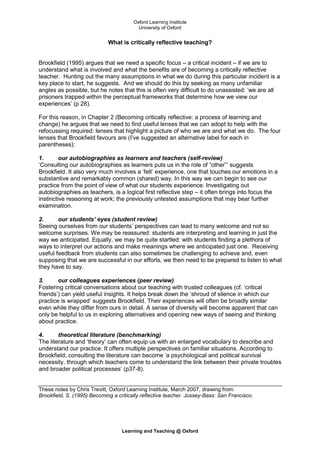
Critically reflectiveteaching
- 1. Oxford Learning Institute University of Oxford What is critically reflective teaching? Brookfield (1995) argues that we need a specific focus – a critical incident – if we are to understand what is involved and what the benefits are of becoming a critically reflective teacher. Hunting out the many assumptions in what we do during this particular incident is a key place to start, he suggests. And we should do this by seeking as many unfamiliar angles as possible, but he notes that this is often very difficult to do unassisted: „we are all prisoners trapped within the perceptual frameworks that determine how we view our experiences‟ (p 28). For this reason, in Chapter 2 (Becoming critically reflective: a process of learning and change) he argues that we need to find useful lenses that we can adopt to help with the refocussing required: lenses that highlight a picture of who we are and what we do. The four lenses that Brookfield favours are (I‟ve suggested an alternative label for each in parentheses): 1. our autobiographies as learners and teachers (self-review) „Consulting our autobiographies as learners puts us in the role of “other”‟ suggests Brookfield. It also very much involves a „felt‟ experience, one that touches our emotions in a substantive and remarkably common (shared) way. In this way we can begin to see our practice from the point of view of what our students experience. Investigating out autobiographies as teachers, is a logical first reflective step – it often brings into focus the instinctive reasoning at work; the previously untested assumptions that may bear further examination. 2. our students’ eyes (student review) Seeing ourselves from our students‟ perspectives can lead to many welcome and not so welcome surprises. We may be reassured: students are interpreting and learning in just the way we anticipated. Equally, we may be quite startled: with students finding a plethora of ways to interpret our actions and make meanings where we anticipated just one. Receiving useful feedback from students can also sometimes be challenging to achieve and, even supposing that we are successful in our efforts, we then need to be prepared to listen to what they have to say. 3. our colleagues experiences (peer review) Fostering critical conversations about our teaching with trusted colleagues (cf. „critical friends‟) can yield useful insights. It helps break down the „shroud of silence in which our practice is wrapped‟ suggests Brookfield. Their experiences will often be broadly similar even while they differ from ours in detail. A sense of diversity will become apparent that can only be helpful to us in exploring alternatives and opening new ways of seeing and thinking about practice. 4. theoretical literature (benchmarking) The literature and „theory‟ can often equip us with an enlarged vocabulary to describe and understand our practice. It offers multiple perspectives on familiar situations. According to Brookfield, consulting the literature can become „a psychological and political survival necessity, through which teachers come to understand the link between their private troubles and broader political processes‟ (p37-8). These notes by Chris Trevitt, Oxford Learning Institute, March 2007, drawing from: Brookfield, S. (1995) Becoming a critically reflective teacher. Jossey-Bass: San Francisco. Learning and Teaching @ Oxford
